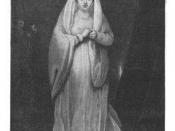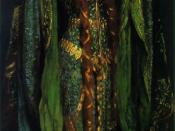Dramatic Significance of Act I Scene vii Shakespeare has become one of the most enduring playwrights because his plays deal with essential issues for people through all generations. Act I Scene vii of Macbeth is a pivotal scene, portraying the agonizing struggle between good and evil. It is in this scene that evil triumphs over good. The conflict between good and evil is shown in Shakespeare's development of the plot, atmosphere and setting, characters, and theme, as well as through vivid imagery and language.
One way Shakespeare portrays the struggle between good and evil in this scene is by making it part of the plot advancement. Macbeth is arguing with himself about whether to commit high treason by killing the king. Macbeth has a lot of ambition to become king, as the prophecy of the three witches says he will, but he does not want to be disloyal, since he is both King Duncan's kinsmen and his subject.
He doesn't want to lose the praises that he has just earned by helping to win the victory for Scotland either. This is why he comes to the conclusion that he will not kill Duncan. This is shown in Macbeth's soliloquy (act I, scene vii, lines 1-28.) However, shortly after he comes to this conclusion Lady Macbeth comes in to see Macbeth. Lady Macbeth helps evil overpower Macbeth by making him feel guilty and by calling him a coward. She makes him feel guilty by saying he would do it if he really loves her, making him think that he has to murder Duncan to prove his love to her. She insults him by telling him that if he can't follow through with his desire to become king, he is not a man. Using these techniques Lady Macbeth overpowers Duncan psychologically and convinces him to kill Duncan. This scene is very important to the play as it is the scene where Macbeth, with help of Lady Macbeth, decides he will carry out the plan to murder Duncan, and frame the guards by getting them drunk and placing evidence on them. Lady Macbeth helps evil overcome the good that could be found in Macbeth.
Although not as powerful, the setting and atmosphere highlight the conflict between good and evil as well. The setting in a room in Macbeth's castle after dinner creates an eerie atmosphere. The music and torches make the atmosphere match the evil Lady Macbeth. This atmosphere creates an eerie mood and ties in perfectly with the conflict taking place between two sides of Macbeth's inner self, good and evil, in which the evil conquers good.
Also, the development of the characters in this scene helps to show the triumph of evil over good. Macbeth is having a conflict within himself. This conflict is whether or not to kill the king. A good part of Macbeth wants to be loyal and wants respect that he has earned. The evil side of Macbeth wants to kill Duncan to gain power. This conflict has Macbeth's conscious sitting on top of a fence trying to decide which side of the fence he wants to get off on. One of these sides is hard working, eager to earn what it gets. This is the part that doesn't want to lose the respect gained by helping Scotland earn victory in the war. It is also this part of Macbeth that wants to be loyal to Duncan, as his kinsman and his subject. The other side of the fence has the same desire to succeed and desire for respect, but is willing to do anything to get it. This side wants to kill Duncan to try to make the prophecy made by the three witches come true. He wants to become king at all costs. Just as Macbeth begins to lean towards the good side of the fence, Lady Macbeth comes and pulls him down on the evil side where she is already situated. During this scene the reader finds out that Macbeth is an easily persuaded individual and Lady Macbeth is extremely evil and takes advantage of Macbeth's weakness by bringing the evil thoughts out of him.
Most importantly, the essential theme in this play is good versus evil. This is such a pivotal scene because Macbeth makes the decision to kill Duncan, taking the evil side in his internal conflict. Shakespeare makes this interesting by having good win over evil in Macbeth's soliloquy. He realizes that such a huge leap must involve a fall. "I have no spur to prick the sides of my intent, but only vaulting ambition, which o'er-leas itself and falls on the other."ÃÂ (Act I, Scene vii, 25-28) This idea does not last very long in Macbeth's mind, however, since Lady Macbeth helps evil dominate the good in Macbeth. A large part of this plot is the argument Macbeth has within himself, and this is the scene where he makes the decision to kill Duncan, allowing evil to be victorious over the good within Macbeth.
Another way Shakespeare shows the clash between good and evil is with his interesting use of language and imagery. Throughout the play, and evident in this scene, Duncan is associated with angels and heaven, while Lady Macbeth and later Macbeth are associated with Satan and hell. These associations are made with the use of similes, metaphors, and personification. "...his virtues will plead like angels, trumpet tongu'd, against the deep damnation of his taking off; and pity like a naked new born babe, striding the blast or heaven's cherubin, hors'd upon the sightless couriers of the air, shall blow the horrid deed in every eye, that tears shall drown the wind."ÃÂ (Act I, scene vii, lines 18-25.) One of these similes compares Duncan's virtues to the powers of angels, and voices of trumpets, which are not happy with the murder. The other compares pity to a tender baby. This simile is also an example of personification, where pity is given characteristics of a baby. By using these similes, Shakespeare describes Duncan with symbols of heaven and angels.
-compares Macb. Praises that he earned to clothes he bought .. doesn't want to lose them by killing Duncan like throwing away his clothes (32-35) -macb.'s ambition is like a horse that tries to jump too high and falls on the other side of the fence.
-Hope gets drunk and has hangover (personification) (36- ?) -Lines 50-? Gruesome images of the death of a infant, showing the disgusting thoughts L. Macb. Has thus associating these grotesque images with her.





